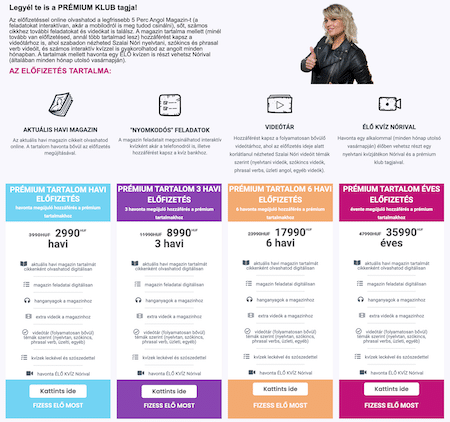Szia,
Remélem kellemesen telt a hétvégéd! Végre itt a tavasz, elérkezett a március, és megjelent a nyomtatott 5 Perc Angol Magazin márciusi száma is!
De ugye tudod, hogy az 5 Perc Angol Magazint nemcsak nyomtatott formában, hanem online is olvashatod? Nézd csak!
Csatlakozz a prémium klubhoz, ahol a tagságoddal hozzáférést kapsz szinte az összes komplett tanfolyami videóhoz (letöltések és feladatok nélkül – “on demand” jelleggel – tehát megnézheted téma szerint a komplett videókat nyelvtan, szókincs, üzleti angol, nyelvvizsga és még sok más témában bárhol és bármennyiszer, míg az előfizetésed tart – közkívánatra hamarosan a kezdő olaszos videók is bekerülnek majd). A videók mellett hozzáférést kapsz az aktuális magazin cikkeihez is – amelyeket online olvashatsz -, sőt 2023 februárig visszamenőleg is (most több, mint 400 komplett lecke szószedettel, feladattal, videóval – de havonta bővül kb 50 új leckével).
Többféle előfizetés közül választhatsz: 1 havi, 3 havi, 6 havi és 12 havi. Nézd csak!


Ha pedig nyomtatva szereted olvasni, akkor az éves előfizetés most extra akciósan kapható, ajándék digitális (pdf) előfizetéssel (hozzáféréssel 2012-ig a teljes magazin archívumhoz)!
… és akkor jöjjön is a mai lecke, egy kis ízelítő a news rovatból!
Üdv,
Nóri
MAI LECKE
Puppies bought during pandemic have high levels of bad behaviour

MEGHALLGATOM A SZÖVEGET ÉS MEGCSINÁLOM AZ INTERAKTÍV FELADATOT: ITT
Almost all the owners said their dog had at least one problem behaviour, such as issues with control, attention-seeking or aggression. By the time the pets reached 21 months old, owners reported an average of five problem behaviours, while 20% said their pets had eight or more.
A study by the Royal Veterinary College (RVC) has found four in five (82%) owners of ‘pandemic puppies’ have reported using aversive, or punishment-based, training methods to try to improve their dog’s behaviours. Aversive techniques, such as shouting at a dog, or jerking its lead, are linked to further behaviour issues and are also ineffective, researchers said.
The most frequent behavioural problems were control behaviours (84%), attention-seeking (77%), fear/avoidance behaviours (41%) and aggressive behaviours (25%). As to how they trained their dogs over the same period, nearly all (96%) owners said they praised their pets verbally, but 80% also reported using one or more aversive methods or aids and 39% admitted they used two or more.
RVC lecturer, Dr Rowena Packer, who led the study, said problem behaviours “are extremely common in pandemic puppies, and in many cases, are potentially being exacerbated by owners using punishment-based training techniques.
The study is part of the RVC Pandemic Puppies project that follows a group of puppies bought during the COVID-19 pandemic in 2020 under the age of 16 weeks from breeders in the UK.
source: Sky News
bad behaviour – rossz viselkedés
owner – gazda
issue – probléma
attention-seeking – figyelemfelkeltés
pandemic puppy – a világjárvány alatt vásárolt kiskutya
aversive – visszatartó
punishment-based – büntetésen alapuló
to improv – javítani
shouting – kiabálás
to jerk its lead – megrántani a pórázát
ineffective – hatástalan
fear – félelem
avoidance – elkerülés
to praise – dicsérni
verbally – szóban
to admit – beismerni, bevallani
to exacerbate – súlyosbítani, növelni
breeder – tenyésztő


